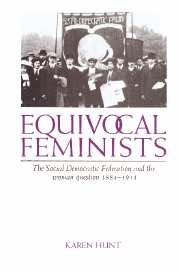Book contents
- Frontmatter
- Contents
- Acknowledgements
- Introduction
- Part 1 The woman question: the theory
- 1 The contribution of the founding fathers
- 2 The SDF's understanding of the woman question
- 3 Understanding the SDF and the woman question
- Part 2 The SDF and the woman question: the theory and practice of the party on aspects of the woman question
- Part 3 Women and the SDF: the practical implications of the SDF's understanding of the woman question
- Conclusion
- Appendices
- Bibliography
- Index
1 - The contribution of the founding fathers
Published online by Cambridge University Press: 14 January 2010
- Frontmatter
- Contents
- Acknowledgements
- Introduction
- Part 1 The woman question: the theory
- 1 The contribution of the founding fathers
- 2 The SDF's understanding of the woman question
- 3 Understanding the SDF and the woman question
- Part 2 The SDF and the woman question: the theory and practice of the party on aspects of the woman question
- Part 3 Women and the SDF: the practical implications of the SDF's understanding of the woman question
- Conclusion
- Appendices
- Bibliography
- Index
Summary
The SDF's theoretical construction of the woman question was shaped by contemporary socialist arguments. Yet the Second International did not have a large body of theory on the woman question. Marx himself had never studied women's oppression in any detail. The scattered and rather general references to the family in The German Ideology, The Communist Manifesto and elsewhere hardly provided a coherent socialist conception of the woman question, and in any case much of Marx's work was either out of print or otherwise unavailable. British socialists were particularly hampered by the fact that much of what was available remained in the original German. Hence the contribution of Marx's thought to the Second International orthodoxy on the woman question lay with his class analysis rather than with any direct examination of the issue itself.
Instead, the texts which set the framework for the socialist understanding of the woman question were Engels' The Origin of the Family, Private Property, and the State (1884) and Bebel's Woman Under Socialism(1879). The authors were two of the most influential men in the Second International. Engels was, after Marx's death in 1883 until his own death in 1895, the de facto leader of the international socialist movement and attempted to influence domestic and international politics accordingly. Bebel was the leader of the largest and most influential party of the Second International, the German Social Democratic Party (SPD).
- Type
- Chapter
- Information
- Equivocal FeministsThe Social Democratic Federation and the Woman Question 1884–1911, pp. 23 - 36Publisher: Cambridge University PressPrint publication year: 1996

